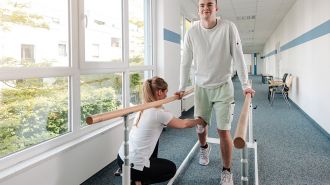
- Our studies
- Our research
- Publications and resources
- Data access and training
- About
- News
- Events
- Get in touch
- Join our mailing list

Welcome to our news and blogs section. Here you’ll find the latest developments and insights from across our longitudinal studies.
Young people from more deprived neighbourhoods have to wait up to 15 minutes longer for accident and emergency (A&E) treatment than their more advantaged peers with similar healthcare needs, according to new findings from Next Steps.

For most young people in England, growing up in the north or south, by the coast or in the city, is less important to their educational progress than their socioeconomic background and whether they come from a deprived neighbourhood.

Graduates who will be drawn into making repayments under new student loans reforms are more likely to be from marginalised groups or in precarious work, writes Dr Charlotte Booth.

Private school pupils in England do not tend to report better mental health or greater life satisfaction in early adulthood than their state-educated peers.

Women who are the first in their family to graduate from university earn 7% less in their mid-20s compared to female graduates whose parents attended university. In contrast, first generation male graduates tend not to face a similar pay penalty.

Researchers tracking the experiences of the millennial generation can now explore a wider range of questions related to the financial costs and benefits of attending university, thanks to newly linked admin and Next Steps survey data.

Researchers can now search and explore a complete set of variable metadata from all sweeps of Next Steps, the only national longitudinal study tracking the lives of the millennial generation.

Researchers tracking the experiences of the millennial generation can now explore a wider range of health-related questions, thanks to a pioneering new agreement which enables secure onward sharing of NHS Digital data linked to Next Steps via the UK Data Service.

Young people who are the first in their family to go to university are less likely to attend an elite institution and are more likely to drop out than those with graduate parents, according to new research led by the UCL Centre for Longitudinal Studies.

Millennials from Black, Asian and Minority Ethnic (BAME) backgrounds are 47% more likely to be on a zero-hours contract, and have 10% greater odds of working a second job, compared to their White peers, according to a new report from the UCL Centre for Longitudinal Studies, Carnegie UK Trust, and Operation Black Vote.

Professor Francis Green, of the UCL Institute of Education, uses Next Steps data to examine the financial rewards of a private school education and asks whether these schools provide a ‘public benefit’.

Gaining a degree gives a smaller boost to Millennials’ salaries than it did for members of Generation X 20 years ago, according to a new study.
Held at the University of Edinburgh, this workshop gave both first-time and more experienced data users an insight into four of the UK’s internationally-renowned cohort studies run by the Centre for Longitudinal Studies (CLS). The slides from this workshop are available to download from this page.
Ryan Bradshaw
Senior Communications Officer
Phone: 020 7612 6516
Email: r.bradshaw@ucl.ac.uk